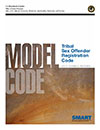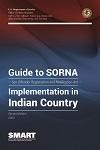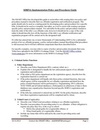Indian Tribes, Nations and Pueblos Implementing SORNA
Under the Adam Walsh Act, all federally recognized Indian tribes are entitled to elect whether to carry out the sex offender registration and notification requirements of the Act or delegate the functions to the state(s) in which the tribal land is located, unless the tribe is subject to the criminal jurisdiction of a state under 18 U.S.C. § 1162 (34 U.S.C. § 20929).
There are currently 137 tribal jurisdictions that have substantially implemented SORNA's requirements.
SORNA Implementation
Publications and Guides to Assist Tribes with Substantial Implementation
Guide to SORNA Implementation in Indian Country
This guide assists tribal jurisdictions with implementing SORNA. It provides a comprehensive overview of SORNA’s requirements and serves as a job aid for sex offender registration personnel in Indian Country. It includes step-by-step directions on completing relevant tasks and has links to helpful templates and guidance documents.
Model Tribal Sex Offender Registration Code
The Model Tribal Sex Offender Registration Code (2017 Revised Version) assists tribes in developing and updating existing sex offender registration legislation to meet SORNA requirements.

SORNA Implementation Policy and Procedures Guide
The SORNA Implementation Policy and Procedures Guide assists tribes with creating their own policy and procedures manuals for their sex offender registration and notification programs. The guide is a useful starting point for a tribe to develop policies and procedures.
SORNA Implementation Tools
National Sex Offender Registry
SORNA requires sex offender registration information be submitted to the FBI’s National Crime Information Center’s National Sex Offender Registry file. Submitting registration information to NCIC/NSOR shares the registration information with law enforcement and criminal justice personnel nationwide. Tribal jurisdictions may have access to NCIC/NSOR under state or local agreements. Tribal jurisdictions participating in the Tribal Access Program have direct access via the Department of Justice.
State and country data codes
Fingerprint and Palm Print Submission
SORNA requires fingerprint and palm prints to be taken from sex offenders during registration for entry into the FBI’s Next Generation Identification (NGI) system. Tribal jurisdictions can use digital print-taking devices (live scan) to collect prints or, if unavailable, can take rolled, inked prints. Tribes can submit prints to NGI following state or local agreements, either by mailing them to the FBI or sending them electronically via the Tribal Access Program.
Ordering fingerprint cards and training aids
Completing fingerprint cards
Preparing criminal fingerprint cards
Capturing palm prints and supplementals
DNA Submission
SORNA requires DNA samples to be taken from sex offenders during registration for entry into the FBI’s Combined DNA Index System (CODIS) if DNA has not been taken and submitted previously. Some states work with tribes that have elected to implement SORNA to help obtain and submit DNA samples from sex offenders for entry into CODIS; eligible tribes may also submit DNA samples directly to the FBI DNA Database Unit. Private labs cannot take DNA samples for sex offender registration because they cannot submit the information to CODIS.
FBI DNA Collection Kits
Tribes submitting directly to the FBI must complete the required buccal collection form, which includes data on each sex offender’s conviction and personal information, two fingerprints, and valid tribal agency contact information. The FBI provides the DNA sample kits free of charge to SORNA tribal registration jurisdictions.
- See the FBI’s DNA Kit Collection Instructions for information on how to collect and submit samples.
- To order DNA Collection Kits, fill out the FBI’s Buccal Collection Kit Reorder Form. Or contact the FBI’s Federal DNA Database Unit:
Email: [email protected]
Phone: 703-632-7529
Fax: 703-632-7620
Mail: Federal DNA Database Unit, 2501 Investigation Parkway, Quantico, VA 22135
Tribal Training & Technical Assistance
The SMART Office can provide training and technical assistance to tribes, nations and pueblos working toward or maintaining substantial implementation. Typical methods of assistance include onsite assistance, conference calls, webinars and training events. If your tribal jurisdiction is interested in receiving assistance, please fill out this request form and email it to [email protected] or call 202-514-4689 for more information.
Tribal Access Program
Tribes implementing SORNA are required to submit sex offender biometrics and biographical data into various federal databases. To help facilitate this, the U.S. Department of Justice through funding from the SMART Office launched the Tribal Access Program (TAP). TAP provides tribes access to national crime information systems, including the National Sex Offender Registry, allowing tribes to exchange critical data for both criminal and civil purposes.
Procedure for Delegation
The Procedure for Delegation of Tribal Sex Offender Registration and Notification Responsibilities describes how the SMART Office determines that a tribe is unable to implement SORNA.




